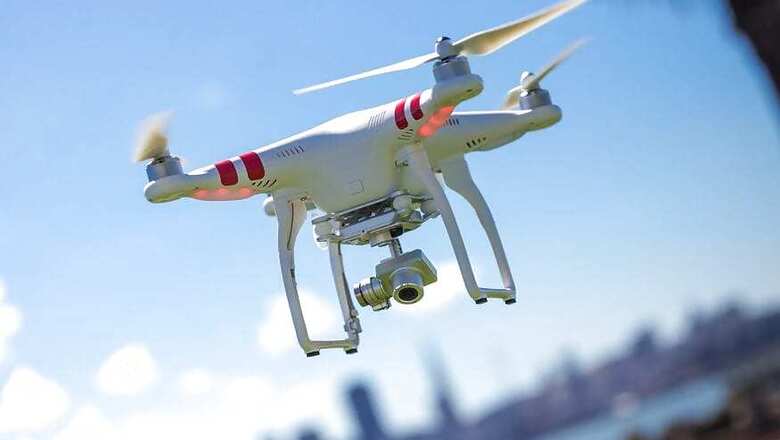
views
Chandigarh: A large number of AK-47 assault rifles, satellite phones and grenades were dropped in Punjab's Tarn Taran district by heavy-lifting drones that came from Pakistan, just across the border, Punjab Police officials said on Tuesday.
Sources told News 18 that the consignment was sent by Pakistan’s spy agency Inter-Services Intelligence (ISI) to carry out an attack of 26/11 magnitude in religious places in Punjab. The drones used for this task were fitted with high-end technology and GPS. The sources added that 8 drones are likely to have been used to drop the arms and ammunition in Punjab.
They carried out at least eight 'sorties' for 10 days in September before dropping the weapons to the designated place, Punjab Police officials said. Preliminary investigation reveals that Pakistan-backed Khalistan Zinadabad Force (KZF) may have used Chinese made drones with the capacity to carry heavy payload to drop AK 47 rifles, ammunition, satellite phones and fake currency in Taran Taran.
On Sunday, five AK-47 rifles and hand grenades were recovered from Rajoke village near Khalra in Tarn Taran as Punjab Police busted a terror module of the KZF, backed by a group based in Pakistan and Germany. The police said the terror group was conspiring to unleash a series of strikes in Punjab and adjoining states.
Sources in the security grid said these drones are commonly used in big farms of Punjab to spray pesticides and fertilisers in crops. "These are not very sophisticated but the advantage with such drones that they can carry a heavy payload," an official said.
The recovery of huge cache of arms has put security agencies on high alert to thwart what appear to be attempts to orchestrate terror attacks on security installation in the country.
Police officials, on the condition of anonymity, said that after four to five sorties, a drone crashed due to a technical problem. This crashed drone was being destroyed by operatives on the Indian side when state police got the whiff and arrested one Shubdeep from the village. The information thus obtained led to the recovery of arms and ammunition, including some satellite phones which agencies suspect were to be used to communicate with Pakistani handlers.
Four more members of the terror module were arrested from the outskirts of Chohla Sahib village on Sunday. Five AK-47 rifles, 16 magazines and 472 rounds of ammunition, four Chinese-made .30 bore pistols, along with eight magazines and 72 rounds of ammunition; nine hand grenades, five satellite phones with their ancillary equipment, two mobile phones, two wireless sets and fake currency with the face value of Rs 10 lakh were seized.
Punjab chief minister Amarinder Singh on Tuesday urged Union home minister Amit Shah to tackle the “drone problem” at the earliest.
"Recent incidents of Pakistan-origin drones dropping consignments of arms & ammunition is a new and serious dimension on Pakistan's sinister designs in aftermath of the abrogation of Article 370. Request @AmitShah ji to ensure that this drone problem is handled at the earliest," Singh tweeted.
Recent incidents of Pakistan-origin drones dropping consignments of arms & ammunition is a new and serious dimension on Pakistan's sinister designs in aftermath of the abrogation of Article 370. Request @AmitShah ji to ensure that this drone problem is handled at the earliest.— Capt.Amarinder Singh (@capt_amarinder) September 24, 2019
Punjab Director General of Police Dinkar Gupta also said that the weapons were suspected to have been delivered recently from across the border by the ISI, state-sponsored jihadi and pro-Khalistani terrorist outfits working under its command.
Meanwhile, the DGCA and the CISF have conducted field trials to procure anti-drone technology. Top sources have told CNN News18 that trials were conducted in Delhi's Rohini and international companies, including Rafeal, Isreal, participated. Sources said two technologies were demonstrated at the trials, Hard Kill which means shooting down a UAV and Soft kill which entails jamming the communication network of the drone. Hard Kill was rejected due to high risk factor.
"The soft kill technology is more apt but at the field trial, the ground communication network of mobiles were also jammed along with the communication mechanism of the drone, " an official said. The DGCA has now asked Idea fore - the company which made drone Netra for DRDO to develop an anti-drone technology at the earliest.
The NIA is set to take over the investigation in the Taran taran case. Sources said the big security lapse of how a UAV was allowed to make multiple sorties across the border will also be probed.



















Comments
0 comment